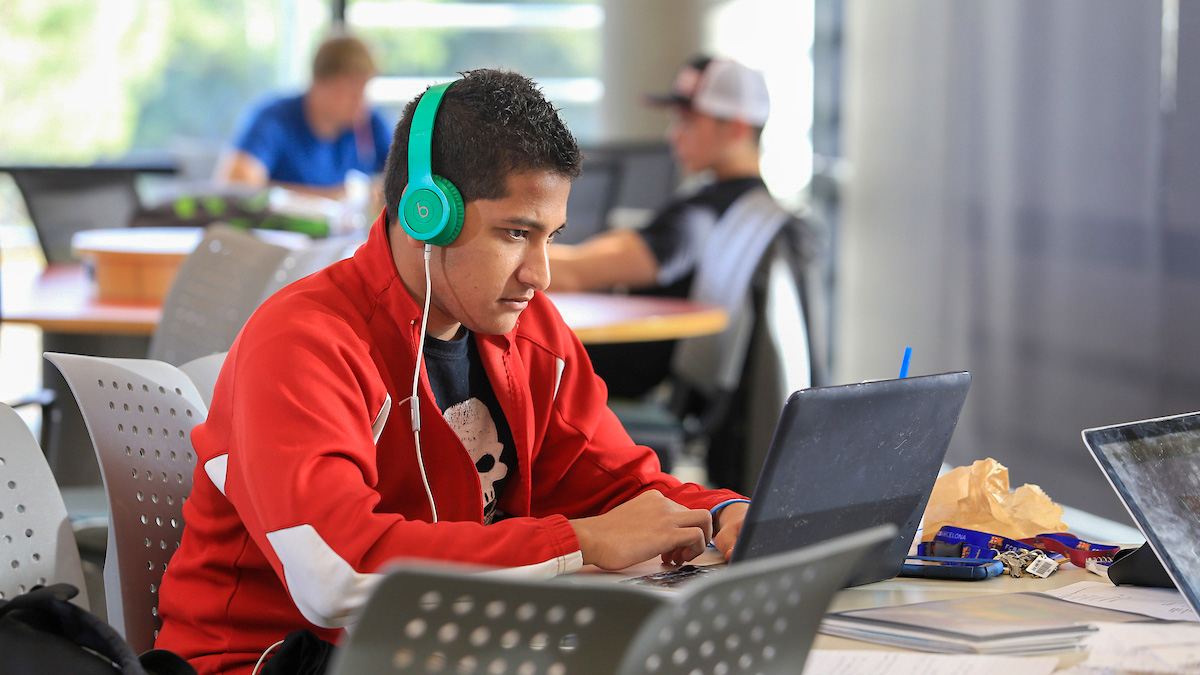Faculty and staff offer students tips on handling Finals Week stress

April 26, 2023
By Marielle Argueza
Finals Week can often mean that certain regular aspects of life – such as eating well and regularly, mental and emotional wellness, and getting enough sleep – can go out the window. When the pressure builds, there are healthy and effective ways to survive and thrive during Finals Week, say CSU Monterey Bay faculty and staff.
"As we near finals, I know our students have worked hard all semester and they are well-prepared for their exams and capstone projects," says President Vanya Quiñones. "I want to remind them all to make sure to take breaks and relax even during this busy time of the year."
Stress from performance anxiety and long cram sessions can affect students' mental well-being. Shannon Snapp, an associate professor of psychology, suggests a holistic approach and ensuring basic needs are met.
"We tend to [invite] imbalance when we're stressed, like not getting enough sleep, not nourishing ourselves, or not hydrating enough," she says. Her advice is to meet those needs first to create a body that functions well, whether for tests or to ward off sickness.
With a healthy body, it's easier to know what one needs mentally, and to ward off any extra anxiety that can come with Finals Week.
"Even when writing a paper, it's important to regulate your emotions,” Snapp says. “Take a step back and take some deep breaths with positive self-talk."
Her favorite breathing exercise mantra is on an inhale, repeat "breathing in, I recognize I am stressed," and on an exhale, repeat "breathing out, I let go of my worry."
Knowing that a sound mind goes hand-in-hand with a sound body, Sara Powell, associate professor in kinesiology, reminds students that "regular exercise and physical activity helps us manage disease and stress, and can impact our overall health."
Powell recommends taking a break every 30-45 minutes and doing gentle movement, such as light yoga or walking outside for vitamin D, at least once every hour. She also suggests doing enjoyable exercise so that it's a familiar coping mechanism and doesn't introduce a new kind of physical stress to the body.
She also warns not to skip meals and healthy snacks during study sessions.
"Hit all your macronutrients with your food – a good amount of carbs, healthy fats, and proteins from things like fruits, vegetables, and nuts," she says. As for caffeine, a popular Finals Week staple, she recommends not going above and beyond what one is used to.
"Starbucks is not the best for managing anxiety."
Sleep is also essential in any kind of normal physical and mental function. And when it comes to performance –- like test-taking and essay-writing – it's essential for memory and decision-making, explains Merideth Canham-Nelson, a lecturer in social work.
"Even when we're talking about getting less than six hours, it's been shown in studies that even that impacts our ability to retain information and any kind of executive functioning," she says.
Canham-Nelson suggests creating a ritual around bedtime and aiming for deep rest.
"Reserve your bed for sleep, sex, and sickness," she says. By that, she means not only not studying in bed but also creating a mental association with the bed as a place for rest (in the case of sleep and sickness). She also says that putting away screens "30 minutes to an hour before bed is fine" to minimize distraction.
Amy Miller, a psychologist at the Personal Growth and Counseling Center, says that with basic needs met, mental wellness and performance follow.
"We tend to find people who are in a good place mentally can more easily process their emotions, and it helps them be more present in their personal and academic lives," says Miller.
In the lead-up to finals, she's noticed a sizeable uptick in avoidance behaviors, such as procrastination. She suggests reflecting on behaviors that have been helpful and unhelpful in the past, and using the helpful behaviors to reinforce studying and stress-coping while mindfully avoiding the unhelpful behaviors.
“Maybe that means studying in a group and not alone. Maybe that means reaching out to your support structures,” Miller says. “It looks different for everyone.”
And even though the campus can feel like a more focused and less socially-active place during Finals Week, Miller says it's prime time to figure out what the campus offers regarding resources.
“There are tons of resources on campus. You don’t have to know them all, but by engaging with your classmates and faculty, you can find a lot of support on campus – whether it’s the tutoring services or the counseling center.”
For more self-care tips and ways to manage stress and anxiety during finals (or any time), check out you.csumb.edu.